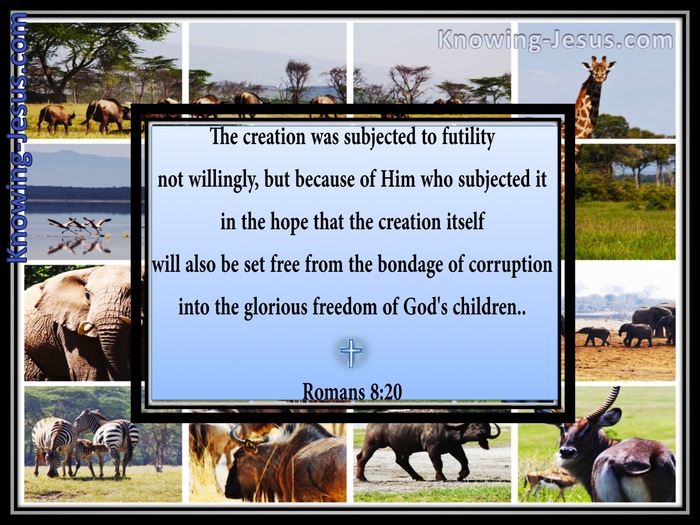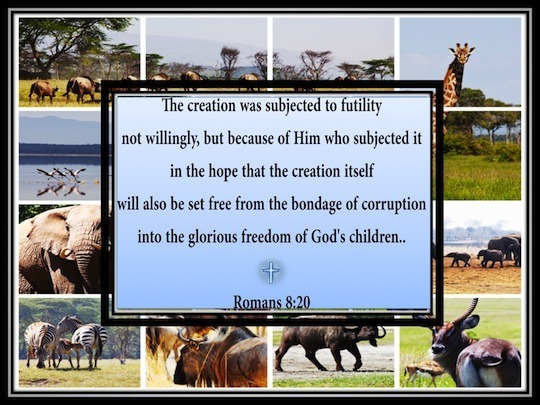Parallel Verses
Anderson New Testament
For the creature was subject to frailty, (not by its own will, but for his sake who subjected it,)
New American Standard Bible
For the creation
King James Version
For the creature was made subject to vanity, not willingly, but by reason of him who hath subjected the same in hope,
Holman Bible
For the creation was subjected
International Standard Version
because the creation has become subject to futility, though not by anything it did. The one who subjected it did so in the certainty
A Conservative Version
For the creation was made subject to futility, not willingly, but because of him who subjected it in hope.
American Standard Version
For the creation was subjected to vanity, not of its own will, but by reason of him who subjected it, in hope
Amplified
For the creation was subjected to frustration and futility, not willingly [because of some intentional fault on its part], but by the will of Him who subjected it, in hope
An Understandable Version
But God subjected the created world to aimless frustration [i.e., after the fall. See Gen. 3:17-18] --- it did not happen by its own choice. Yet there was hope
Bible in Basic English
For every living thing was put under the power of change, not by its desire, but by him who made it so, in hope
Common New Testament
For the creation was subjected to futility, not of its own will, but by the will of him who subjected it in hope;
Daniel Mace New Testament
who were not, by their own choice, expos'd to this uncertain state, but by virtue of him, who subjected them thereto:
Darby Translation
for the creature has been made subject to vanity, not of its will, but by reason of him who has subjected the same, in hope
Godbey New Testament
For the creature has been subordinated to mortality, not willingly, but through Him who subordinated it;
Goodspeed New Testament
For it was not the fault of creation that it was frustrated; it was by the will of him who condemned it to that, and in the hope
John Wesley New Testament
For the creation was made subject to vanity, not willingly, but by him who subjected it,
Julia Smith Translation
For the creation was subject to vanity, not voluntarily, but by him having subjected in hope,
King James 2000
For the creation was made subject to vanity, not willingly, but by reason of him who has subjected the same in hope,
Lexham Expanded Bible
For the creation has been subjected to futility, not willingly, but because of the one who subjected [it], in hope
Modern King James verseion
For the creation was not willingly subjected to vanity, but because of Him who subjected it on hope
Modern Spelling Tyndale-Coverdale
because the creatures are subdued to vanity against their will: but for his will which subdueth them in hope.
Moffatt New Testament
For creation was not rendered futile by its own choice, but by the will of Him who thus made it subject,
Montgomery New Testament
For nature was subjected to imperfection, not by its own will, but by the will of Him who thus made it subject??21 yet not without the hope that some day nature itself also will be freed from the thralldom of decay, into the freedom which belongs to the glory of the children of God.
NET Bible
For the creation was subjected to futility -- not willingly but because of God who subjected it -- in hope
New Heart English Bible
For the creation was subjected to vanity, not of its own will, but because of him who subjected it, in hope
Noyes New Testament
For the creation was brought into subjection to vanity not of its own will, but by reason of him who put it into subjection,
Sawyer New Testament
For the creation was subjected to a perishable condition, not willingly, but by him that subjected it, in hope
The Emphasized Bible
For, unto vanity, hath creation been made subject - not by choice, but by reason of him that made it subject, in hope
Thomas Haweis New Testament
For the creation was made subject to vanity, not voluntarily, but by him who made it subject,
Twentieth Century New Testament
For Nature was made subject to imperfection-not by its own choice, but owing to him who made it so--
Webster
For the creature was made subject to vanity, not willingly, but by reason of him who hath subjected the same in hope:
Weymouth New Testament
For the Creation fell into subjection to failure and unreality (not of its own choice, but by the will of Him who so subjected it)
Williams New Testament
For nature did not of its own accord give up to failure; it was for the sake of Him who let it thus be given up, in the hope
World English Bible
For the creation was subjected to vanity, not of its own will, but because of him who subjected it, in hope
Worrell New Testament
For the creation was made subject to vanity, not of choice, but by reason of Him Who subjected it, in hope
Worsley New Testament
(for the world was subjected to vanity, not willingly, but through him who made it subject:)
Youngs Literal Translation
for to vanity was the creation made subject -- not of its will, but because of Him who did subject it -- in hope,
Themes
Corruption » Who shall be delivered from corruption
Freedom/liberty » What shall be liberated from the bondage of corruption
Redemption » Who waits hopefully for redemption
Suffering » The sufferings of this present time
Vanity » What was made subject to vanity
Topics
Interlinear
Hupotasso
References
American
Easton
Fausets
Word Count of 37 Translations in Romans 8:20
Prayers for Romans 8:20
Verse Info
Context Readings
The Glory That Is To Be Revealed
19 For the earnest expectation of the creature waits for the revelation of the sons of God. 20 For the creature was subject to frailty, (not by its own will, but for his sake who subjected it,) 21 in hope, that even the creature itself shall be made free from the bondage of corruption, and introduced into the glorious liberty of the children of God.
Cross References
Romans 8:22
For we know that every creature groans, and is in pain together, till now:






